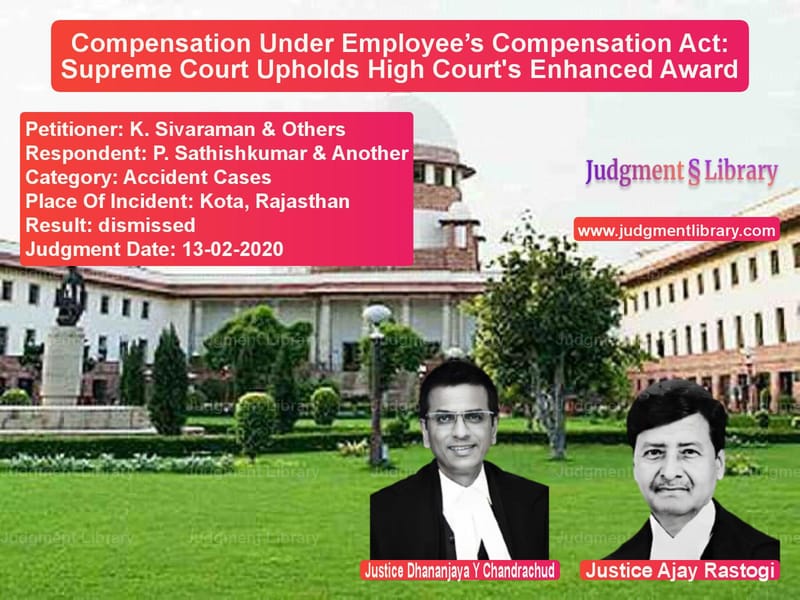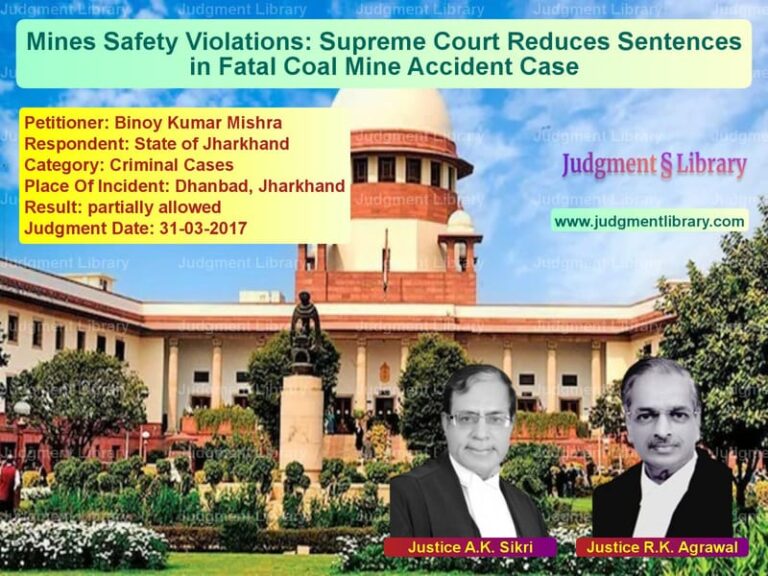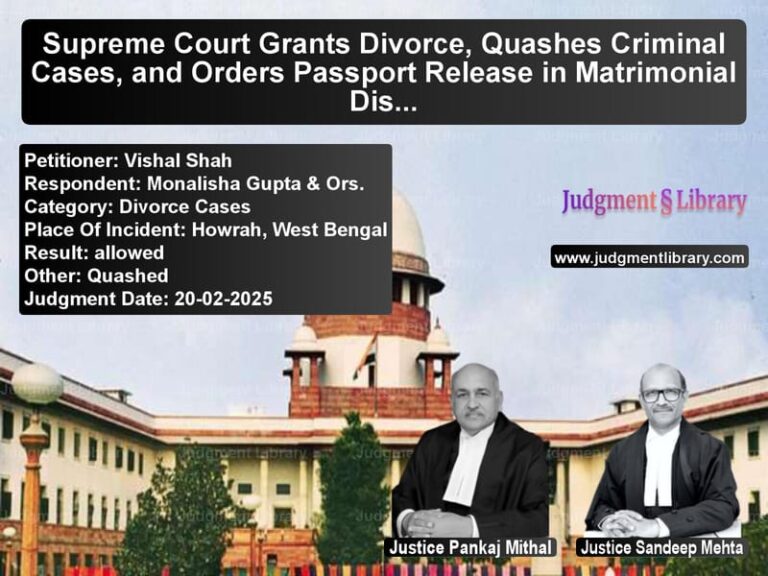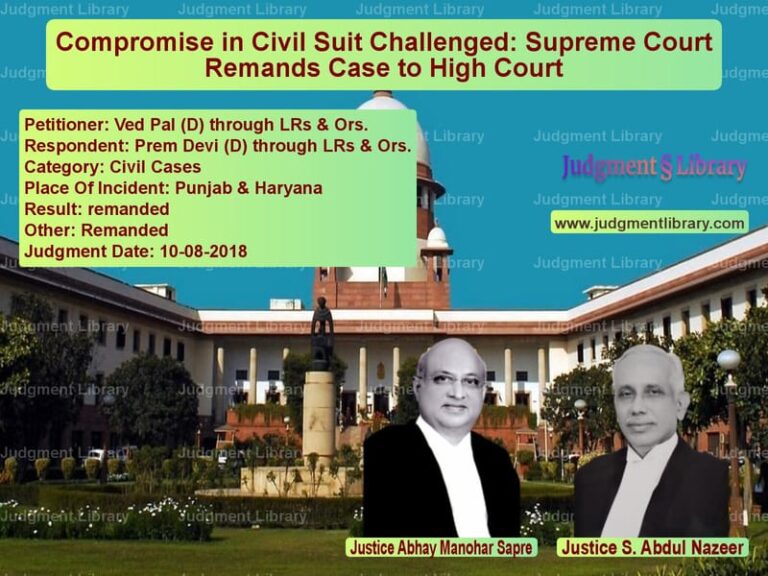Compensation Under Employee’s Compensation Act: Supreme Court Upholds High Court’s Enhanced Award
The Supreme Court of India, in its judgment dated 13 February 2020, dealt with a case concerning the enhancement of compensation under the Employee’s Compensation Act, 1923. The case involved the family of a deceased worker who was employed as a driver and died in a road accident. The legal battle revolved around determining the rightful compensation, taking into account amendments made to the Act.
Background of the Case
The case originated from the unfortunate death of Dinesh Kumar, a 26-year-old trailer lorry driver, in an accident that occurred on 31 January 2008. The deceased was employed by the first respondent and was engaged in transporting goods from Puducherry to Rajasthan when a truck coming from the opposite direction collided with his vehicle, leading to his death.
The appellants, who were the parents and siblings of the deceased, filed a claim under the Employee’s Compensation Act before the Deputy Commissioner for Employees’ Compensation, Madurai. On 26 March 2014, the Deputy Commissioner awarded them compensation amounting to Rs. 4,33,060. Dissatisfied with the amount, the appellants approached the Madras High Court, which enhanced the compensation to Rs. 8,86,120, with interest at the rate of 12% per annum from the date of the accident.
The respondents challenged this enhancement before the Supreme Court, arguing that the High Court had erred in considering the amendments that were introduced after the date of the accident.
Arguments of the Parties
Petitioners (Appellants) Argued:
- The deceased was earning Rs. 32,000 per month, as evidenced by Exhibit P5, a salary certificate issued by his employer.
- The Deputy Commissioner had wrongly capped the monthly wage at Rs. 4,000 based on an outdated provision, which was later amended in 2010 to increase the cap to Rs. 8,000.
- The amendment to the Employee’s Compensation Act should apply retrospectively, ensuring fair compensation based on actual earnings.
Respondents (Employer and Insurance Company) Argued:
- The compensation should be calculated based on the law applicable on the date of the accident, i.e., 31 January 2008.
- The amendment enhancing the wage cap to Rs. 8,000 came into effect only in 2010 and should not be applied retrospectively.
- Reliance was placed on past judgments where courts had ruled that compensation under the Act is determined based on the law prevailing at the time of the accident.
Supreme Court’s Analysis
The Supreme Court carefully examined the legal provisions and past rulings before delivering its verdict. The key observations made by the Court were:
1. The Relevant Date for Compensation Calculation
The Court reiterated the settled legal position that the compensation payable under the Employee’s Compensation Act is to be determined based on the law prevailing on the date of the accident. The Court observed:
“The relevant date for the determination of compensation payable is the date of the accident, and the benefit of the 2009 amendment does not apply to accidents that took place prior to its coming into force.”
The Court relied on its past rulings, including Pratap Narain Singh Deo v. Srinivas Sabata and Kerala State Electricity Board v. Valsala K, which held that amendments enhancing compensation do not apply retrospectively.
2. Amendment to Wage Cap Under the Act
The Court acknowledged that the wage ceiling of Rs. 4,000, as applicable at the time of the accident, was removed through the 2009 amendment, which took effect in 2010. However, it held that:
“The amendment was meant to apply prospectively, and there was no indication from the legislature that it was intended to have a retrospective effect.”
3. Judicial Precedents on Retrospective Application
The Court discussed various precedents, including Neelakandan’s case, where an amendment was applied retrospectively, but clarified that this ruling had been overruled in Valsala’s case. The Court reaffirmed that changes in compensation law apply prospectively unless explicitly stated otherwise by the legislature.
4. Compassionate View Under Article 142 of the Constitution
Despite ruling that the High Court had erred in applying the amendment retrospectively, the Supreme Court exercised its special powers under Article 142 of the Constitution to ensure justice. It noted:
“Although the enhancement was not strictly in accordance with the law, considering that the case had been pending for over 12 years, we are not inclined to interfere with the High Court’s decision.”
Thus, the Court upheld the compensation of Rs. 8,86,120 awarded by the High Court.
Final Judgment
The Supreme Court dismissed the appeal and ruled that:
- The enhanced compensation of Rs. 8,86,120, as awarded by the High Court, will stand.
- Interest at 12% per annum will be payable from the date of the accident.
- The employer and the insurance company were held jointly and severally liable for the payment.
- The compensation amount must be paid to the appellants within two months from the receipt of a certified copy of the judgment.
Conclusion
This judgment highlights the importance of adhering to statutory provisions while determining compensation under the Employee’s Compensation Act. The Supreme Court reaffirmed that amendments enhancing compensation do not apply retrospectively unless expressly stated by the legislature. However, in an exceptional use of its powers, the Court upheld the High Court’s award to provide relief to the claimants, ensuring that justice was not denied due to procedural technicalities.
Petitioner Name: K. Sivaraman & Others.Respondent Name: P. Sathishkumar & Another.Judgment By: Justice Dhananjaya Y Chandrachud, Justice Ajay Rastogi.Place Of Incident: Kota, Rajasthan.Judgment Date: 13-02-2020.
Don’t miss out on the full details! Download the complete judgment in PDF format below and gain valuable insights instantly!
Download Judgment: K. Sivaraman & Other vs P. Sathishkumar & An Supreme Court of India Judgment Dated 13-02-2020.pdf
Direct Downlaod Judgment: Direct downlaod this Judgment
See all petitions in Compensation Disputes
See all petitions in Worksite Accidents
See all petitions in Judgment by Dhananjaya Y Chandrachud
See all petitions in Judgment by Ajay Rastogi
See all petitions in dismissed
See all petitions in supreme court of India judgments February 2020
See all petitions in 2020 judgments
See all posts in Accident Cases Category
See all allowed petitions in Accident Cases Category
See all Dismissed petitions in Accident Cases Category
See all partially allowed petitions in Accident Cases Category







